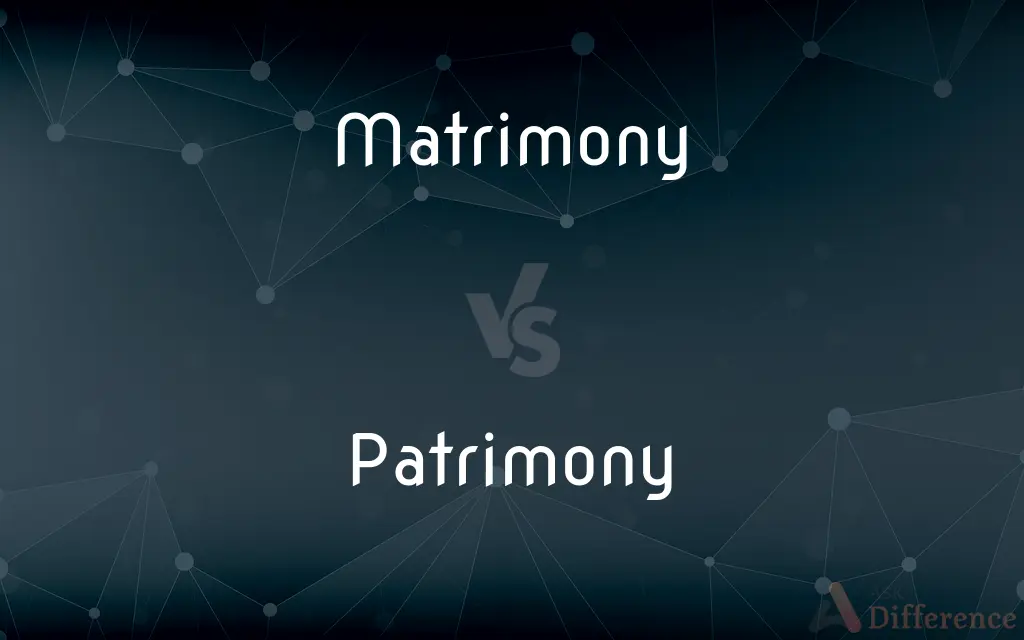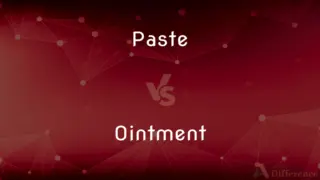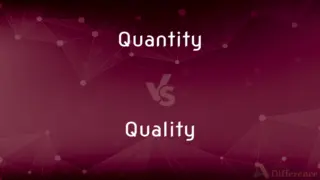Matrimony vs. Patrimony — What's the Difference?
Edited by Tayyaba Rehman — By Fiza Rafique — Updated on April 27, 2024
Matrimony refers to the state or institution of marriage, emphasizing union and partnership, whereas patrimony relates to inheritance, typically from a father or ancestral property.

Difference Between Matrimony and Patrimony
Table of Contents
ADVERTISEMENT
Key Differences
Matrimony is primarily understood as the institution of marriage, binding partners in a legal and cultural union recognized by society. It symbolizes commitment and the beginning of a familial unit. On the other hand, patrimony pertains to what one inherits from one's ancestors or father, often relating to property or wealth, and highlights the transmission of legacy and assets through generations.
While matrimony involves ceremonies and legal contracts that establish rights and responsibilities between married individuals, patrimony involves legal and sometimes traditional processes that determine the distribution of assets from one generation to another. Matrimony is about starting a new shared life, whereas patrimony deals with the continuity of family heritage.
Matrimony requires the consent and active participation of the individuals getting married, reflecting a personal choice and commitment. Conversely, patrimony is usually automatic and governed by laws or family traditions, not necessarily requiring active participation from those receiving the inheritance.
In terms of societal impact, matrimony often affects social status and personal identity, linking individuals to a shared social recognition as a couple. Patrimony impacts economic status and responsibility, as it involves managing or inheriting wealth or property that may affect an individual's financial standing and duties.
Matrimony and patrimony also carry different cultural significances; matrimony is celebrated with rituals and is seen as a milestone in personal life, whereas patrimony is associated with familial duty and the preservation of family wealth or status. These roles outline how each concept influences social structure and personal relationships differently.
ADVERTISEMENT
Comparison Chart
Definition
The institution of marriage
Inheritance from one's father or ancestors
Key Focus
Union and partnership
Legacy and inheritance
Legal Involvement
Marriage contracts and ceremonies
Inheritance laws and traditions
Personal Impact
Affects marital and social status
Affects economic status and responsibilities
Cultural Significance
Celebrated, life milestone
Associated with duty and family legacy
Compare with Definitions
Matrimony
The act or process of marrying and living as spouses.
After years of friendship, they decided to enter matrimony.
Patrimony
The heritage or tradition passed down through generations.
The patrimony of their family business included longstanding community ties.
Matrimony
The institution governing marriage, including rights and duties.
They entered into matrimony understanding their responsibilities to each other.
Patrimony
The state of inheriting from paternal lineage.
She took pride in the patrimony that linked her to her forefathers.
Matrimony
A sacred or formal recognition of a couple's relationship.
In many cultures, matrimony is seen as a sacred bond.
Patrimony
An inheritance, especially from male ancestors.
Her patrimony included not just wealth but also several valuable antiques.
Matrimony
A legally and socially recognized union between partners.
Matrimony brought them not only love but also legal benefits.
Patrimony
An inheritance from a father or paternal ancestor.
Matrimony
The state of being married or the ceremony of marriage.
Their matrimony was celebrated with a grand ceremony.
Patrimony
An inheritance or legacy; heritage.
Matrimony
Marriage and matrimony is not the same.
Patrimony
An endowment or estate belonging to an institution, especially a church.
Matrimony
The act or state of being married; marriage.
Patrimony
A right or estate inherited from one's father; or, in a larger sense, from any male ancestor.
Matrimony
(uncountable) Marriage; the state of being married.
Patrimony
Formerly, a church estate or endowment.
Matrimony
(countable) The ceremony of marriage.
Patrimony
A right or estate inherited from one's father; or, in a larger sense, from any ancestor.
Matrimony
(uncountable) A particular solitaire card game using two decks of cards.
Patrimony
Formerly, a church estate or endowment.
Matrimony
The union of man and woman as husband and wife; the nuptial state; marriage; wedlock.
If either of you know any impediment, why ye may not be lawfully joined together in matrimony, ye do now confess it.
Patrimony
A church endowment
Matrimony
A kind of game at cards played by several persons.
Patrimony
An inheritance coming by right of birth (especially by primogeniture)
Matrimony
The state of being a married couple voluntarily joined for life (or until divorce);
A long and happy marriage
God bless this union
Patrimony
Property inherited from a father or ancestor.
He received the family farm as his patrimony.
Matrimony
The ceremony or sacrament of marriage
Patrimony
Assets or rights acquired by inheritance.
His patrimony was carefully managed to ensure long-term prosperity.
Common Curiosities
What does patrimony mean?
Patrimony refers to inheritance or property passed down from one's father or ancestors.
What cultural significance does matrimony hold?
Matrimony is often seen as a crucial life milestone, celebrated with ceremonies and recognized by societal and religious norms.
What is matrimony?
Matrimony is the state of being married, involving a recognized and celebrated union between two individuals.
Is patrimony only related to financial inheritance?
While often financial, patrimony can also include non-monetary heritage such as traditions, skills, or family roles.
And in what contexts might someone use "patrimony"?
"Patrimony" is often used in legal or historical contexts related to inheritance, property rights, or genealogy.
Can matrimony have legal implications?
Yes, matrimony carries significant legal implications regarding property, inheritance, and personal rights between spouses.
How is patrimony typically received?
Patrimony is typically received through legal inheritance processes or by tradition within families.
How do matrimony and patrimony relate to family structures?
Matrimony pertains to the formation of a marital union, while patrimony involves the passing down of assets or wealth within a family lineage.
What are the responsibilities involved in matrimony?
Responsibilities in matrimony include mutual support, loyalty, and sharing of marital rights and duties.
In what contexts might someone use the term "matrimony"?
"Matrimony" is commonly used in discussions about marriage, family law, and religious ceremonies.
Share Your Discovery

Previous Comparison
Paste vs. Ointment
Next Comparison
Quantity vs. QualityAuthor Spotlight
Written by
Fiza RafiqueFiza Rafique is a skilled content writer at AskDifference.com, where she meticulously refines and enhances written pieces. Drawing from her vast editorial expertise, Fiza ensures clarity, accuracy, and precision in every article. Passionate about language, she continually seeks to elevate the quality of content for readers worldwide.
Edited by
Tayyaba RehmanTayyaba Rehman is a distinguished writer, currently serving as a primary contributor to askdifference.com. As a researcher in semantics and etymology, Tayyaba's passion for the complexity of languages and their distinctions has found a perfect home on the platform. Tayyaba delves into the intricacies of language, distinguishing between commonly confused words and phrases, thereby providing clarity for readers worldwide.
















































